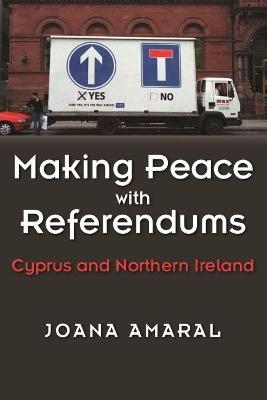
Making Peace with Referendums
Cyprus and Northern Ireland
Seiten
2019
Syracuse University Press (Verlag)
978-0-8156-3642-7 (ISBN)
Syracuse University Press (Verlag)
978-0-8156-3642-7 (ISBN)
Referendums have become an undeniably important, and perhaps inescapable, peacemaking tool. As such, understanding the ways in which referendum outcomes are shaped by peace negotiations is vital. Drawing on two case studies, Amaral presents a rich comparative analysis of the Annan Plan in Cyprus and the Good Friday Agreement in Northern Ireland.
Referendums have become an undeniably important, and perhaps inescapable, peacemaking tool in contemporary peace processes. As such, understanding the ways in which referendum outcomes are shaped by peace negotiations is vital. Drawing upon two case studies, Amaral presents an empirically rich comparative analysis of the Annan Plan in Cyprus and the Good Friday Agreement in Northern Ireland. She examines the negotiations, offering new interview material with key political and civil figures involved in the peace negotiations and referendum campaigns in both cases. Amaral argues that referendums are unsuitable for traditional secretive and exclusionist peace negotiations that fail to engage and educate the public. They rather require inclusive negotiations that involve a broad spectrum of political stakeholders and civil society at the early stages of the process. This collaborative approach can allow referendums to positively shape societies in conflict and be a crucial step toward lasting peace.
Referendums have become an undeniably important, and perhaps inescapable, peacemaking tool in contemporary peace processes. As such, understanding the ways in which referendum outcomes are shaped by peace negotiations is vital. Drawing upon two case studies, Amaral presents an empirically rich comparative analysis of the Annan Plan in Cyprus and the Good Friday Agreement in Northern Ireland. She examines the negotiations, offering new interview material with key political and civil figures involved in the peace negotiations and referendum campaigns in both cases. Amaral argues that referendums are unsuitable for traditional secretive and exclusionist peace negotiations that fail to engage and educate the public. They rather require inclusive negotiations that involve a broad spectrum of political stakeholders and civil society at the early stages of the process. This collaborative approach can allow referendums to positively shape societies in conflict and be a crucial step toward lasting peace.
Joana Amaral is a research fellow at the Center for Conflict Studies at the University of Marburg in Germany.
| Erscheinungsdatum | 02.05.2019 |
|---|---|
| Reihe/Serie | Syracuse Studies on Peace and Conflict Resolution |
| Verlagsort | New York |
| Sprache | englisch |
| Maße | 140 x 216 mm |
| Gewicht | 253 g |
| Themenwelt | Recht / Steuern ► Allgemeines / Lexika |
| Recht / Steuern ► EU / Internationales Recht | |
| Sozialwissenschaften ► Politik / Verwaltung ► Europäische / Internationale Politik | |
| Sozialwissenschaften ► Politik / Verwaltung ► Politische Theorie | |
| ISBN-10 | 0-8156-3642-3 / 0815636423 |
| ISBN-13 | 978-0-8156-3642-7 / 9780815636427 |
| Zustand | Neuware |
| Haben Sie eine Frage zum Produkt? |
Mehr entdecken
aus dem Bereich
aus dem Bereich
Studienbuch
Buch | Hardcover (2023)
De Gruyter Oldenbourg (Verlag)
44,95 €
erfolgreiche Interessenvertretung durch Prozesskompetenz im komplexen …
Buch | Hardcover (2023)
Wiley-VCH (Verlag)
42,00 €


